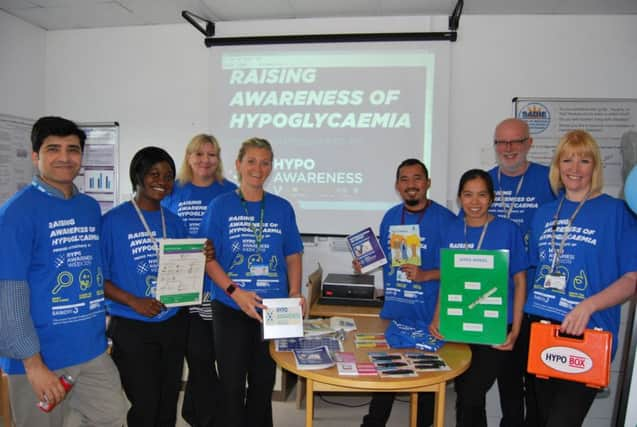East Sussex NHS Trust promote Hypo Awareness Week


The action comes as part of a national drive to improve staff knowledge and patient care.
The trust’s diabetes teams are staging a seven-day campaign to raise awareness about, and reduce episodes of, hypoglycaemia in aid of Hypo Awareness Week.
Advertisement
Hide AdAdvertisement
Hide AdHypoglycaemia, also known as a hypo, takes place when the blood glucose levels of people with diabetes drop too low. They can feel shaky, unwell and, in extreme cases, can slip into a coma.
Donna Caranto, diabetes nurse educator, said, “The diabetes teams are working hard to reduce incidence of hypos through education and through events such as the Hypo Awareness Week.
“We want our patients to be safe and to have a positive experience while they are in our care, so as a team we will continue to work together in finding ways to improve patient experience in hospital.”
Erwin Castro, diabetes nurse consultant, said, “We are working very hard to provide training and resources to staff in the prevention, recognition and management of this acute diabetes complication.
Advertisement
Hide AdAdvertisement
Hide Ad“We want to ensure that our patients with diabetes get safe and excellent care.”
According to results from the 2017 national diabetes inpatient audit, around one in six hospitals beds are occupied by a person with diabetes.
Dr Gerry Rayman, the national clinical lead for the audit, has said since 2010 there has been a 30 per cent reduction in severe hypoglycaemia in hospitals, with Hypo Awareness Week helping to raise awareness annually since 2012.
However, almost one in five inpatients with diabetes experiences hypoglycaemia during their hospital stay.
Advertisement
Hide AdAdvertisement
Hide AdAs part of a week-long series of activities, the trust is staging training events to raise awareness of the condition.
Resources, including guidelines, leaflets and educational slides, are being used to help spread the word. Along with daily ward rounds, a hypo quiz, hypo simulation and other activities.